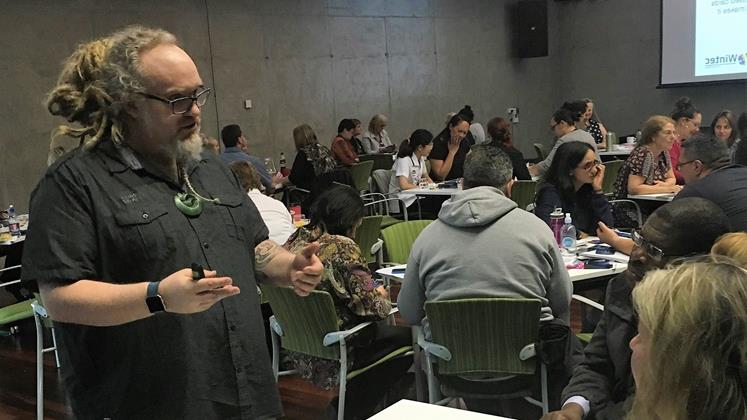A new approach to Māori mental health

Andre McLachlan demonstrating the Whai Tikanga toolkit at a recent workshop at Wintec.
More than 200 mental health practitioners and clinical psychologists across New Zealand are now equipped with an innovative toolkit to help Māori affected by mental health and addiction issues.
Co-created by Wintec staff member and clinical psychologist, Andre McLachlan, the toolkit recognises the importance of using a Māori-centred approach for Māori clients and whānau.
The toolkit is revolutionary as the majority of alternative techniques used to improve mental health are based on Western values.
“By using a Māori-centred approach to therapy, practitioners can utilise traditional Māori concepts of health and promote Māori values. This can enhance engagement and psychological outcomes for whānau,” says Andre.
The toolkit comprises four activities: Whai Tikanga values cards, Te Whare Tapa Wha, a Pleasant events schedule and Korurangi. Each activity in the toolkit enables whānau to explore what’s important to them using traditional Māori values.
The Whai Tikanga values cards are a set of cards which have the name and description of a Māori value on one side and a whakatauki (Māori proverb) on the other side. Each card is aligned to one of four wellbeing components from Ta Mason Durie’s Te Whare Tapa Wha model of wellbeing.
The Whai Tikanga Pleasant events schedule aligns with te whare tapa wha, the four cornerstones or sides of Māori health and provides a range of activities that people can use to strengthen each aspect of their wellbeing.
The Korurangi is an adapted version of a sociogram where whānau are supported to explore their relationships and support systems.
These four activities culminate in the development of Te Mahere Oranga – a wellbeing plan.
“The Whai Tikanga values cards help whānau to identify which take pū (values) are most important to them and where these take pū (values) come from. This connects whānau strongly with the motivating force of their whakapapa. The practitioner can then work with whānau to explore these values and start looking at how this person can start living by these values. This has the effect of addressing concerns by increasing wellbeing and resilience through whakapapa korero (original instructions/whānau narratives),” says Andre.
After being used by grassroots practitioners and clinicians such as nurses, social workers, counsellors and psychologists across the country, Andre says the toolkit has been well-received and is getting extremely positive feedback.
Whanganui-based clinical psychologist Dr Rebecca Wirihana uses the cards regularly in group therapy and individual therapy.
“I find that people respond to the cards to such a degree that they have actually asked to take them home to remind them of their learnings. They are extremely useful for engagement, particularly with their use of te reo Māori,” she says.
“Most importantly, they can be used to identify the values people feel are important in their lives and, as clinicians, this is integral to ensuring that we are working in a manner that best suits their needs.”
The toolkit requires practitioners to have a thorough understanding of tikanga Māori, so it is mainly being used by Māori practitioners.
Wintec has partnered with Te Rau Matatini in exploring a digital version of the Whai Tikanga values cards to make it more accessible for practitioners and whānau.
To find out more about the toolkit please contact the Te Rau Matatini Training Coordinator or watch an introductory video here.
Read more about Whai Tikanga Maori centered values.

